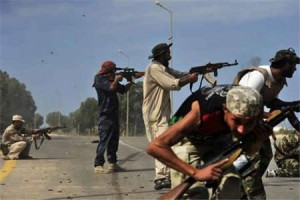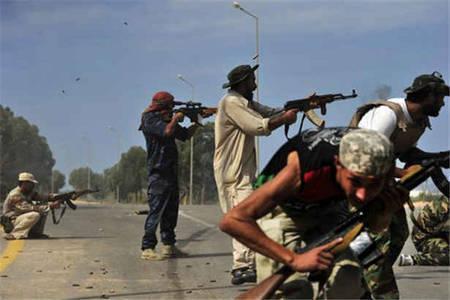 For five years, Libya has been plagued with chaos and the inability of state institutions to have effective control on the ground. Marked by a political gridlock since the signing of the Libya Political Agreement in December 2015, the central government, thus far, has been unable to bring the various military and paramilitary groups under its control, amid the continued spread of weapons, widespread impunity, and increased terror attacks. Moreover, human rights violations by all parties continue unabated along with a sharp increase in the numbers of those internally displaced as a result of the continuing conflict or due to the deteriorating humanitarian situation. A strategy must be implemented to prevent further deterioration of the situation.
For five years, Libya has been plagued with chaos and the inability of state institutions to have effective control on the ground. Marked by a political gridlock since the signing of the Libya Political Agreement in December 2015, the central government, thus far, has been unable to bring the various military and paramilitary groups under its control, amid the continued spread of weapons, widespread impunity, and increased terror attacks. Moreover, human rights violations by all parties continue unabated along with a sharp increase in the numbers of those internally displaced as a result of the continuing conflict or due to the deteriorating humanitarian situation. A strategy must be implemented to prevent further deterioration of the situation.
The Government of National Accord will not be able to confront the momentous challenges it faces without listening to the voices of civil society representatives and domestic actors from across the spectrum. Authorities must make a clean break with the practices of past governments, which refused to initiate a direct dialogue with civil society and pushed the country into a civil war, the price of which Libyans continue to pay.
In this context, several Libyan civil society groups, along with the Cairo Institute for Human Rights Studies (CIHRS), met in May 2016 to discuss a framework for common action, devise strategies for joint work in the coming period, and identify needs, challenges, and ways to sustainably communicate. The groups also discussed ways of combining efforts to confront the current erosion of the human rights situation in Libya.
All participants in the 2-day meeting noted that civil society organizations (CSOs) have become targets of attack for many parties in the conflict. Libyan civil society institutions face a number of difficulties including rising violence, increasing attacks by armed groups, as well as being subjected to numerous pressures and threats. For example, in November 2015, the Ministry of Culture and Civil Society in Western Libya issued a decree[1] requiring all CSOs to inform the ministry of any events, conferences, or meetings it may hold or attend outside Libya and receive prior approval before attending. In another example, in early 2016, the Civil Society Commission issued regulations number 1 and 2 that severely restrict the operations of local and international CSOs.
These regulations control the registration and the activities of local and international CSOs. These regulations are also applicable to the associations registered from 2011 to review their registration process within 3 months from the date of their issuing. These decrees put a restrictive framework very similar to the one adopted by the repressive Gaddafi era. All of these measures serve to close the public sphere for moderate voices. As a result, CSOs, activists, and media workers are caught between death and exile, while others are forced to suspend their work for fear of reprisals. In pushing moderate voices out, extremists have monopolized the domestic public space and are the only ones able to work in safety given the security and financial support they receive from various political factions and competing armed groups.
On the other hand, while rights violations by various parties continue unabated, Libyan civil society is facing challenges trying to document these rising violations, amid a considerable rise in terror attacks as extremist groups continue to claim more Libyan territory. ISIS has extended its control even further by targeting the areas around Sirte, its major stronghold. In Sirte, the terrorist group has prohibited the city’s population from leaving the city, using them as human shields. This is taking place in the absence of an effective international mechanism to monitor ongoing violations.
The participants of the meeting agreed on a number of objectives including breaking the isolation of human rights CSOs and human rights defenders in Libya and abroad while better distributing roles among them; creating a space for them to converge, dialogue and think in order to devise an integrated vision for their work; creating a strategic vision for change and influence on various fronts; bridging the gap created by the absence of an international mechanism for documentation by working to raise the capacity of Libyan CSOs in playing an effective role documenting and monitoring violations as well as in domestic, regional, and international advocacy; supporting genuine and effective participation by CSOs in the adoption of political solutions and monitoring the implementation of agreements to ensure civil society’s inclusion in the transitional phase.
As such, the participating organizations call for a secure public space and guarantees for freedom of expression and freedom of association for active civic bodies—including human rights activists, media workers, town mayors, and tribal sheikhs—to enable them to play a major role in ensuring the success of a sustainable peace process. Empowering these civic actors may be Libya’s only hope for fighting extremism of all kinds and stopping the spread of extremist ideologies across the country.
Recommendations
- End all ongoing grave human rights violations and breaches of international humanitarian law, including torture, extrajudicial killings, indiscriminate attacks on civilian areas and infrastructure, and the targeting of civilians.
- Draft a legal framework to regulate the operation of civil society associations that does not restrict freedom of association, and in accordance with international standards, and repeal regulations and laws that curtail and restrict the work of local and international non-governmental organizations.
- Guarantee freedom of expression, association, and peaceful assembly; protect activists, CSOs, journalists and media outlets from attacks, and ensure their safety and ability to work in a secure environment.
- Combat hate speech and incitement to violence in the media.
- Work to increase social awareness of human rights work and its role in deterring violations; and protect and promote human rights.
- Raise the capacity of national institutions working to protect and promote human rights in Libya, and guarantee their effectiveness and independence.
- Reform the security sector through a transparent and comprehensive vetting process, and implement the security arrangements which include effective appropriate plans for security structures and forces, including effective command and control arrangements that will ensure accountability for perpetrators of human rights violations.
- Take measures to guarantee the safety and independence of judges, lawyers, and citizens who seek justice and redress for violations against themselves or others.
- Implement a process of transitional justice with the goal of ensuring that victims can access judicial institutions and find fair, comprehensive redress.
Signatory Organizations:
- Cairo Institute for Human Rights Studies
- Belaady Foundation
- Defenders Network
- Independent Organization for Human Rights
- Jurists without Chains
- Libyan Center for Freedom of Press
- Libyan journalists Independent Syndicate
- Libyan Organization for Legal Aid
- Libyan Women’s Platform for Peace
- Women Defenders Network
- Youth for Tawergha organization
[1] No meetings without our permission Tripoli authorities tell NGO activists
Share this Post

